Thin Outside, Fat Inside: The Hidden Danger of TOFI and How Nutrition Can Help
You might look slim on the outside, but are you truly healthy on the inside? Enter TOFI—Thin Outside, Fat Inside. This hidden condition affects millions of people who appear fit but have unhealthy levels of internal fat surrounding their organs. In this blog, we’ll dive deep into what TOFI is, why it’s dangerous, and how the right nutrition and lifestyle changes can help you combat it.
What is TOFI? The Silent Health Threat
TOFI, or Thin Outside, Fat Inside, is a silent health threat that often goes unnoticed because individuals with this condition appear lean but have excessive visceral fat stored around their internal organs. Unlike subcutaneous fat, which is stored under the skin and visible, visceral fat accumulates around the liver, pancreas, and intestines, increasing the risk of serious metabolic disorders. People with TOFI may have a normal Body Mass Index (BMI) but suffer from insulin resistance, high blood sugar levels, inflammation, and an increased risk of conditions like type 2 diabetes, heart disease, and fatty liver disease.
This condition is often linked to poor dietary habits, high consumption of processed foods, lack of physical activity, and chronic stress. Since TOFI individuals do not exhibit obvious signs of obesity, they may not prioritize healthy lifestyle changes, making the condition even more dangerous. The only way to diagnose TOFI is through body composition analysis, such as MRI, CT scans, or DEXA scans, which reveal hidden fat deposits. To combat TOFI, a balanced diet rich in whole foods, fiber, healthy fats, and lean proteins, combined with regular exercise, particularly strength training and cardiovascular activities, is essential.
Lifestyle modifications, including stress management and adequate sleep, also play a crucial role in reducing visceral fat. Awareness about TOFI is important because even those who appear fit externally may be at risk for serious metabolic complications, emphasizing that true health goes beyond weight and appearance. This condition is often overlooked because people assume that being slim means being healthy. However, TOFI is a ticking time bomb, increasing the risk of:
- Insulin resistance and type 2 diabetes
- Heart disease
- High blood pressure
- Fatty liver disease
- Chronic inflammation
How Does TOFI Happen? The Science Behind It
TOFI (Thin Outside, Fat Inside) occurs when the body stores excessive visceral fat around internal organs, despite a person having a normal or low body weight. This hidden fat accumulation is primarily caused by metabolic imbalances, poor lifestyle choices, and genetics. Unlike subcutaneous fat, which is stored just beneath the skin and serves as an energy reserve, visceral fat is more dangerous as it surrounds critical organs like the liver, pancreas, and intestines, releasing harmful substances that disrupt metabolic function.
One of the key factors behind TOFI is insulin resistance, where the body’s cells become less responsive to insulin, leading to increased fat storage in the abdominal region. Skinny Fat: Definition, Causes, and Lifestyle Modifications: This article delves into the concept of being “skinny fat,” exploring its causes and offering lifestyle changes to address the issue medicalnewstoday.com.
This condition is often triggered by a high-sugar, high-fat diet, and lack of physical activity, which promote the buildup of visceral fat even in individuals who appear lean. Additionally, chronic stress plays a role by increasing cortisol levels, a hormone that encourages fat storage in the abdominal area. Hormonal imbalances and genetics can also predispose some individuals to store fat in their organs rather than under the skin.
- Genetics and Metabolism
Some people are genetically predisposed to store more visceral fat than subcutaneous fat. Their metabolism may prioritize fat storage around internal organs instead of under the skin, making them appear lean but metabolically unhealthy. - Poor Diet and High Sugar Intake
Diets high in processed foods, refined carbs, and sugary drinks contribute to insulin resistance, leading to fat accumulation around vital organs. Excessive sugar intake promotes fat storage in the liver and pancreas, increasing metabolic risks. - Lack of Physical Activity
A sedentary lifestyle prevents the body from burning excess fat, leading to the buildup of visceral fat. Even individuals with normal weight can develop TOFI if they do not engage in regular strength training or cardiovascular exercise. - Insulin Resistance and Hormonal Imbalance
High insulin levels due to excessive carbohydrate consumption can cause the body to store fat around organs. Hormonal imbalances, such as high cortisol from chronic stress, also contribute to visceral fat accumulation. - Chronic Stress and High Cortisol Levels
Prolonged stress increases cortisol, a hormone that encourages fat storage around the abdomen. Stress-induced eating habits, such as consuming comfort foods high in sugar and unhealthy fats, worsen the condition. - Aging and Muscle Loss
As people age, they tend to lose muscle mass and gain fat if they do not maintain an active lifestyle. Reduced muscle mass leads to a slower metabolism, making it easier for visceral fat to accumulate. - Sleep Deprivation
Poor sleep disrupts hormones that regulate appetite and fat storage. Lack of sleep increases cravings for unhealthy foods and leads to increased visceral fat storage due to hormonal imbalances.
TOFI is a hidden risk, and maintaining a healthy lifestyle with a nutrient-rich diet, regular exercise, and stress management is essential for preventing its harmful effects.
The Role of Diet in Combating TOFi
The good news? TOFI is reversible, and nutrition plays a pivotal role in tackling it. Here’s how you can use diet to fight internal fat:
- Prioritizing Whole Foods
A diet rich in whole, unprocessed foods helps regulate metabolism and prevent visceral fat accumulation. Fresh fruits, vegetables, whole grains, lean proteins, and healthy fats provide essential nutrients without excess calories or harmful additives. - Reducing Processed and Sugary Foods
Processed foods high in refined sugars, unhealthy fats, and additives contribute to insulin resistance and fat buildup around organs. Cutting down on sugary drinks, fast food, and refined carbohydrates can significantly reduce visceral fat. - Increasing Protein Intake
Lean protein sources like fish, eggs, poultry, legumes, and tofu help preserve muscle mass, boost metabolism, and keep hunger in check. Higher protein intake prevents fat storage while supporting overall body composition. - Incorporating Healthy Fats
Healthy fats from sources like avocados, nuts, seeds, and olive oil improve insulin sensitivity and help reduce inflammation. Omega-3 fatty acids from fatty fish also play a crucial role in reducing visceral fat and supporting heart health. - Fiber-Rich Diet for Gut Health
Soluble fiber from foods like oats, legumes, flaxseeds, and vegetables supports gut health, slows digestion, and regulates blood sugar levels. A healthy gut microbiome is linked to better fat metabolism and reduced risk of TOFI. - Balancing Carbohydrate Intake
Instead of refined carbs, focus on complex carbohydrates such as quinoa, brown rice, and sweet potatoes. These provide sustained energy, prevent blood sugar spikes, and reduce fat storage in the liver and abdomen. - Hydration and Detoxification
Drinking plenty of water helps with digestion, metabolism, and toxin elimination. Green tea, herbal teas, and infused water can further support fat loss and prevent visceral fat accumulation. - Mindful Eating and Portion Control
Overeating, even healthy foods, can contribute to fat storage. Practicing mindful eating, chewing slowly, and managing portion sizes can help regulate appetite and prevent excess calorie intake.
A balanced diet, combined with an active lifestyle and stress management, is essential in combating TOFI and improving overall metabolic health.
The Science Behind Nutrition and TOFI
The science behind nutrition and TOFI (Thin Outside, Fat Inside) revolves around how food choices influence metabolism, fat storage, and hormonal balance. TOFI individuals may appear lean but have excessive visceral fat stored around their internal organs, increasing their risk of metabolic diseases like diabetes, heart disease, and fatty liver. Poor dietary habits, such as consuming high amounts of processed foods, refined sugars, and unhealthy fats, lead to insulin resistance, a condition where the body struggles to regulate blood sugar effectively, promoting fat accumulation around vital organs.
Lifestyle Changes to Complement Your Diet
While nutrition is key, combining it with these lifestyle changes can amplify your results:
- Exercise Regularly: Incorporate both cardio (like walking, running, or cycling) and strength training (like weightlifting or bodyweight exercises) to burn fat and build muscle.
- Manage Stress: Practice mindfulness, yoga, or meditation to lower cortisol levels and reduce fat storage.
- Get Enough Sleep: Poor sleep disrupts hormones that regulate hunger and fat storage. Aim for 7-8 hours of quality sleep each night.
Final Thoughts
TOFI is a silent health threat that affects even those who appear thin, making it a dangerous and often overlooked condition. Unlike visible obesity, TOFI develops internally, with fat accumulating around vital organs, increasing the risk of diabetes, heart disease, and metabolic disorders. However, the good news is that with the right nutrition and lifestyle changes, you can combat hidden fat, boost metabolism, and enhance your overall well-being. A balanced diet rich in whole foods, lean proteins, healthy fats, and fiber, combined with regular exercise, stress management, and quality sleep, can help prevent and reverse TOFI. True health is not just about how you look on the outside but about how your body functions on the inside.
Ready to take control of your health? Explore our expert-designed diet plans and home workout services at Nutricop. Let’s work together to achieve a healthier, fitter you—inside and out!
Stay tuned to Nutricop for expert nutrition guidance and personalized meal plans! Start your journey to a healthier, happier you today—get your custom meal plan now at Nutricop’s Diet Plans! Contact us.








